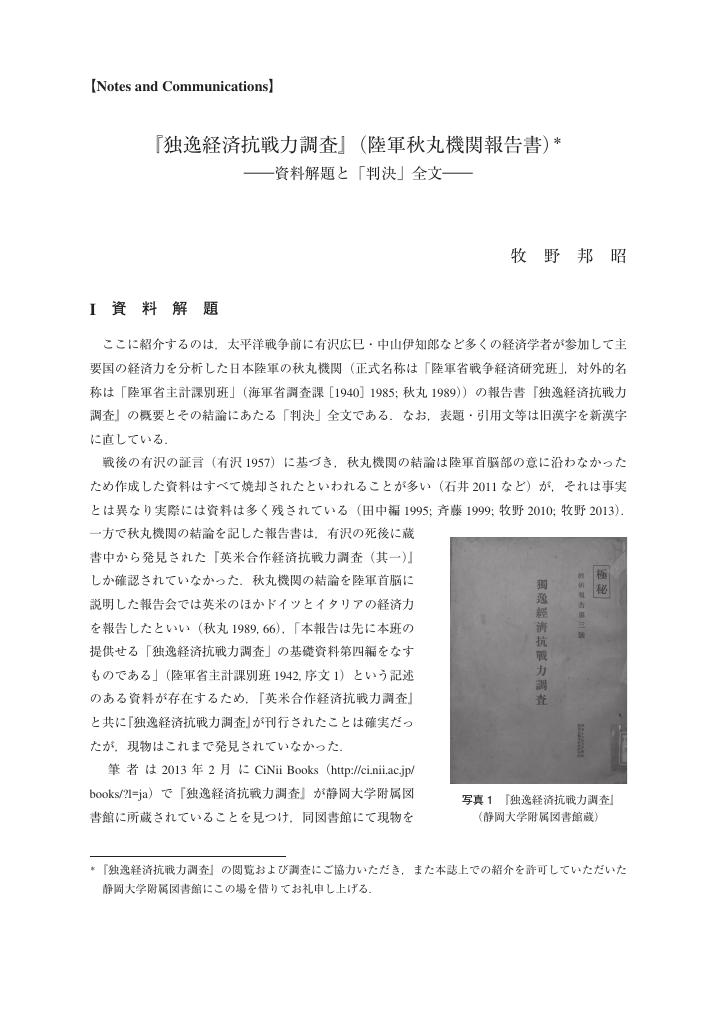4 0 0 0 戦争と平和の経済思想~経済学の浸透は国際紛争を軽減できるか
本研究は、3つの時代と2つの国(および全世界)という特徴的な時期・国に焦点を当て、「戦争・平和と経済学」の複雑な関係を歴史的・思想的に精査することで、「経済学は戦争を回避し平和を構築することに貢献できるのか」という根源的な問いに回答する。初年度に続き、二年目はこの共同研究を軌道に乗せ、特に、(a))学術雑誌(英語)の「戦争と平和の経済思想」シリーズを特集させること、(b)近隣の社会科学者や政策担当者に開かれた形で、日本語による専門書・啓蒙書を編纂すること、という二点を推進した。その具体例として、(a)学術雑誌History of Economic Thoughtにおいて、War and Economicsというシリーズを2017年度中に3回連載し、研究分担者・連携研究者による3本の英語論文を掲載した。また、(b)いくつかの出版社と交渉し、『戦争と平和の経済思想』(晃洋書房、2018年度後期に出版予定)として出版するべく、11人による原稿を集め、草稿を検討する研究会も行った。2017年度における最大の実績は、Fabio Masini (the University of Roma Tre, Italy) とMaria Paganelli (Trinity University, USA)という研究者を招き、2日間に渡り、広島修道大学で国際会議を開催したことである(2017.9.4-5)。平和記念館の資料にもアクセスできたことは大きな収穫であった。二番目の実績は、経済学史学会・全国大会で、スミス研究の世界的権威Nicholoas Phillipsonの招待講演を実現したことである。特に、現実主義的な側面をスコットランド啓蒙研究の立場から、一般会員にも平易に講演された。
- 著者
- 牧野 邦昭
- 出版者
- 中央公論新社
- 雑誌
- 中央公論 (ISSN:05296838)
- 巻号頁・発行日
- vol.134, no.1, pp.60-67, 2020-01
3 0 0 0 OA 『英米合作経済抗戦力調査(其二)』(陸軍秋丸機関報告書) : 資料解題
- 著者
- 牧野 邦昭
- 雑誌
- 摂南経済研究 = Setsunan Economic Review
- 巻号頁・発行日
- vol.5, no.1・2, pp.107-116, 2015-03
3 0 0 0 OA 『経済戦の本質』(陸軍秋丸機関中間報告案) : 資料解題と「要旨」全文
- 著者
- 牧野 邦昭
- 雑誌
- 摂南経済研究 = Setsunan Economic Review
- 巻号頁・発行日
- vol.6, no.1・2, pp.117-126, 2016-03
2 0 0 0 OA 高田保馬の社会学と経済学―「理論」と「時論」
- 著者
- 牧野 邦昭
- 出版者
- 京都大学経済学会
- 雑誌
- 経済論叢 (ISSN:00130273)
- 巻号頁・発行日
- vol.197, no.2, pp.17-35, 2023-12-08 (Released:2023-12-08)
本研究では,京都帝国大学や,県立兵庫高等商業学校,琉球大学などに着目し,まず,そのような高等教育機関が,どういった経緯で,既存の高等教育機関に対抗して設立されたのか,検討を行う。さらにそれらの高等教育機関において,対抗関係と特殊な事情の下で掲げられた,教育・研究に関する理念が,現実との関係のなかでどのように変容していったのか,分析を行う。この研究では,帝国大学などを軸とした「国策」に基づく高等教育機関の設置やその発展とは異なる,全国各地で地域のニーズに応じて設置・運営された後発の高等教育機関像を並列することで,日本における高等教育機関の複線的記述を一層拡張することを試みていく。
2 0 0 0 OA 『独逸経済抗戦力調査』(陸軍秋丸機関報告書) 資料解題と「判決」全文
- 著者
- 牧野 邦昭
- 出版者
- 経済学史学会
- 雑誌
- 経済学史研究 (ISSN:18803164)
- 巻号頁・発行日
- vol.56, no.1, pp.96-102, 2014 (Released:2019-08-24)
- 著者
- 牧野 邦昭
- 出版者
- 経済学史学会
- 雑誌
- 経済学史研究 (ISSN:18803164)
- 巻号頁・発行日
- vol.56, no.2, pp.150-151, 2015 (Released:2019-11-30)
- 著者
- 牧野 邦昭
- 出版者
- The Japanease Society for the History of Economic Thought
- 雑誌
- 経済学史研究 (ISSN:18803164)
- 巻号頁・発行日
- vol.59, no.1, pp.1-20, 2017 (Released:2019-09-01)
Abstract: In order to explore the relationship between war and economics in the era of imperialism and total war, this paper mainly covers Tanzan Ishibashi, a Japanese economic journalist who lat-er became a politician and served as Prime Minister. Ishibashiʼs basic thought consisted of the ʻprinciple of independenceʼ and the ʻprinciple of network.ʼ The latter emphasized production by the division of labor of free agents; con-sumption by transactions between economic agents enabling production; and international peace as a premise of the international division of labor and trade. Therefore, Ishibashi con-sistently advocated for the ʻlittle Japanism,ʼ which opposed imperialism and bloc economies, aiming for peaceful economic development through international trade. However, while Ishibashiʼs arguments regarding lifting the gold embargo and an expan-sionary fiscal policy led to the restoration of the economy at the national level, they also ex-acerbated poor relations with China and the United Kingdom and became a factor behind the Sino-Japanese War and the Pacific War. Moreover, military expenditure-based fiscal expan-sion necessitated a transition to the controlled economy that Ishibashi criticized. Ishibashiʼs arguments thus betrayed his ideals. On the other hand, according his princi-ples, he promoted the institutionalization of economics in wartime by building a personal network, secured freedom of thought and activities through this means, and also used his per-sonal network to create a post-war plan for the world economy based on free trade. Understanding the gap between Ishibashiʼs economic thought and reality, and under-standing his struggles in trying to cross that gap, are important when thinking about a modern society in which protectionism and chauvinism are on the rise as globalization progresses. JEL classification numbers: B 27, B 31, N 45.

